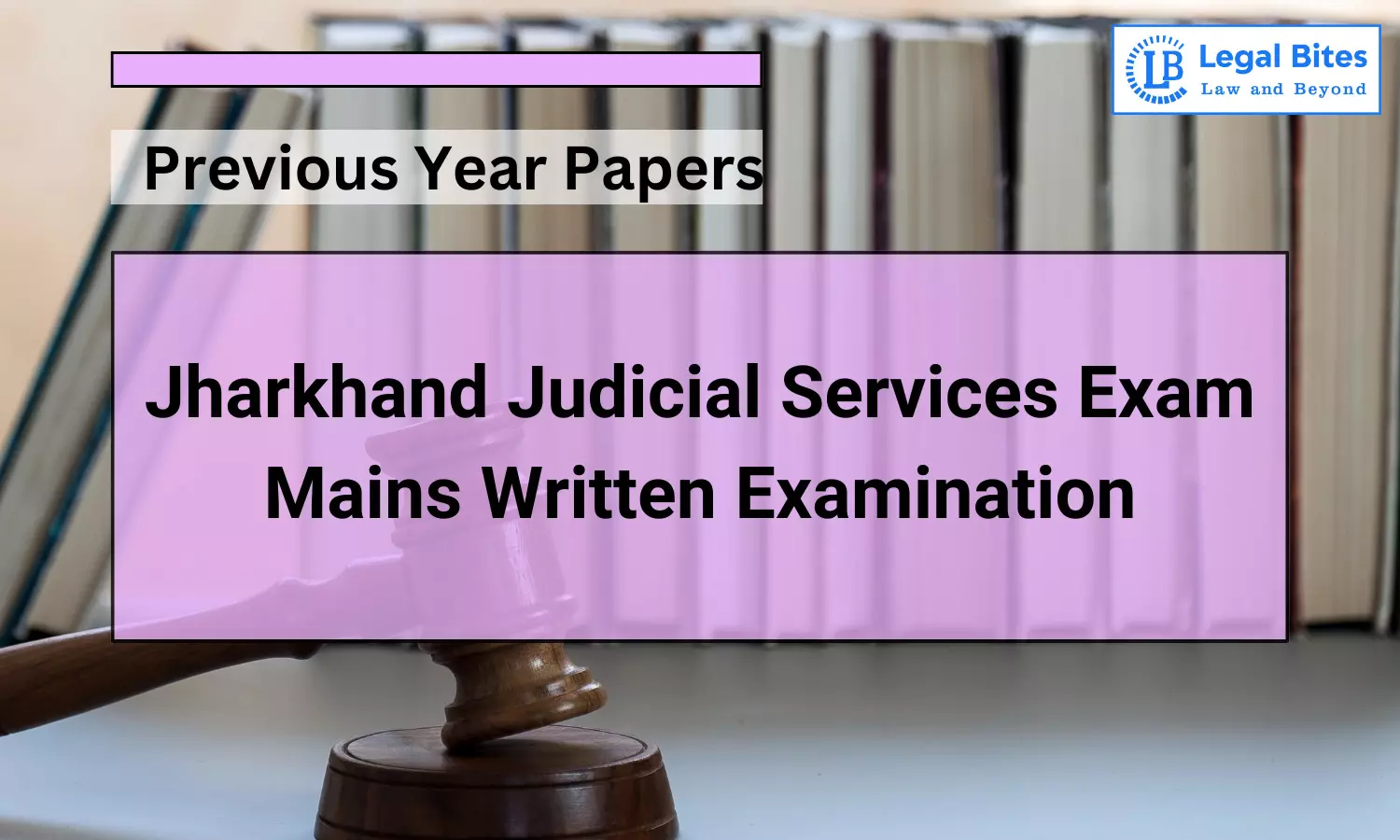Jharkhand Judicial Services Exam Mains 2018 Previous Year Paper I | IPC, CrPC, CPC, Indian Evidence Act and Limitation Act
Candidates preparing for Jharkhand Judicial Services Exam should solve the Jharkhand Judicial Services Exam Mains 2018 Paper I.

Candidates preparing for the Jharkhand Judicial Services Exam should solve the Jharkhand Judicial Services Exam Mains 2018 (Paper-I) and other previous year question papers before they face Prelims and Mains.
It also gives an idea about the syllabus and how to prepare the subjects by keeping the previous year's questions in mind. All toppers are mindful and cognizant of the types of questions asked by the Jharkhand Judicial Services, to be aware of the various tricks and types of questions. This should be done by every aspirant when starting their preparation. It is very important to have an overall understanding of the pattern and design of questions. Join Jharkhand Mains Mock Test Series for rigorous Practice: SPONSORED
Jharkhand Judicial Services Exam Mains 2018 Previous Year Paper -I: Indian Penal Code, 1860, Code of Criminal Procedure, 1973, Code of Civil Procedure, 1908, Indian Evidence Act, 1872 and Limitation Act, 1963
Only practising the authentic question papers will give you a real feel of the pattern and style of the questions. Here's Jharkhand Judicial Services Exam Mains 2018 Previous Year Paper-I.
Jharkhand Judicial Services Mains Written Examination 2018
(IPC, CrPC, CPC, Indian Evidence Act and Limitation Act)
(IPC, CrPC, CPC, Indian Evidence Act and Limitation Act)
Time: 3 Hours
Maximum Marks: 100
Question paper is divided into five Sections. Each Section has two questions of each 20 marks. Out of which candidates have to answer only one question compulsorily from each Section. Questions can be answered in Hindi (Devnagri) or English (Roman) only
Section - A
Question 1
(b) Answer any two of the following: [5*2 = 10 Marks]
(ii) Mesne Profit
(iii) Interpleader suit
(iv) Garnishee Order
Question 2
Section B
Question 3
(a) What do you understand by the doctrine of autre fois acquit and autre fois convict? How does it ensures fair trial? [10 Marks]
Question 4
(a) Whether the Trial Court has discretion while awarding concurrent or consecutive sentences to an accused in a criminal trial? [10 Marks]
(b) Answer any two of the following: [5*2 = 10 Marks]
(i) Cognizable and Non-cognizable offence
(ii) Anticipatory Bail
(iii) Plea bargaining
(iv) Search and Seizure
Section C
Question 5
(b) 'A' severally injured a beautiful girl walking in the market by throwing the acid on her body. She is admitted in hospital in dying state. What offence 'A' has committed and how much punishment he deserves under Indian Penal Code, 1860? [10 Marks]
Question 6
Section D
Question 7
(a) Explain the 'Privileged Communication"." 'A' client confides in 'B', his lawyer that he has a forged deed in his possession on the basis of which he wants to file a case against 'C' to get possession of land." Is this communication protected under the law from disclosure? Critically examine the statement. [10 Marks]
(b) Write detailed notes on: [5*2 = 10 Marks]
(i) The doctrine of Res gestae
(ii) FIR is not a substantive piece of evidence.
Question 8
(b) Explain the following any two: [5*2=10 Marks]
(i) Falsus in uno falsus in omnibus.
(ii) Essential conditions of Dying Declaration
(iii) Cross Examination
(iv) Hostile Witness
Section - E
Question 9
(a) Law of Limitation simply bars judicial remedy. It neither affects extra-judicial remedy nor the substantive right. Discuss. [10 Marks]
(b) Explain the maxim. "Vigilantibus non dormientibus jura subveniunt'. To what extent the doctrine is incorporated in the law of limitation in India? Explain. [10 Marks]
Question 10
(a) Can an acknowledgement made under Section 18 of the Limitation Act, 1963, after the expiry of limitation but when there are vacations and the courts are closed, save the limitation? Discuss. [10 Marks]
(b) A Hindu wife executed a mortgage deed of the property of her husband, as if it were her own, after the 5 years her husband had disappeared. The mortgage was invalid as the presumption of death does not arise until 7 years. The mortgagee filed a suit more than 7 years after the execution of mortgage deed and proved that her husband has not been heard of since last seven years. Discuss the validity of the claim of the mortgagee. [10 Marks]

